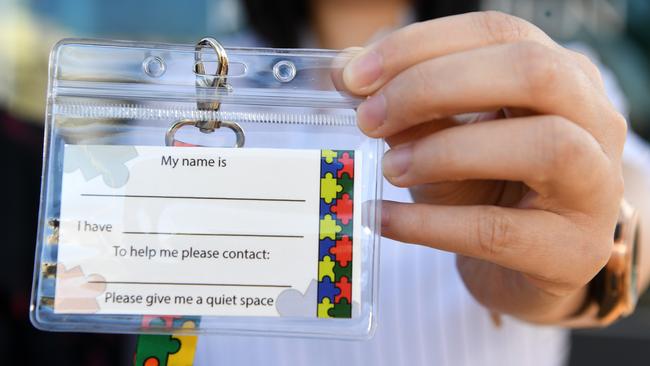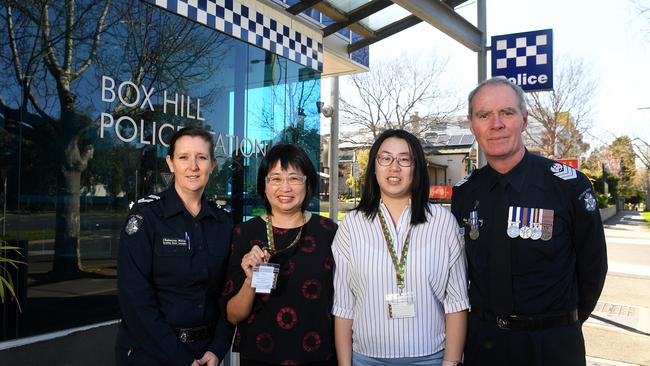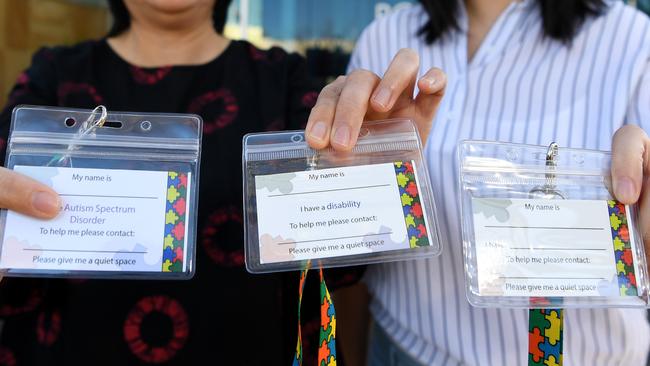Box Hill: Safety Card Project helps police and people with autism and disabilities
The behaviour of people with autism can sometimes appear suspicious or threatening to police. But a new system aims to make their condition clearer, making life easier for both parties.

East
Don't miss out on the headlines from East . Followed categories will be added to My News.
Communication between authorities and people living with autism and disabilities is being strengthened in Box Hill thanks to a program designed to make life easier for both parties.
People with autism and disabilities can obtain free cards and lanyards to easily identify themselves as needing extra assistance, through the Safety Card Project.
The cards and lanyards, which bear the international symbol for autism, also explain the wearer’s potentially unusual behaviour to lower suspicions they may be raising with authorities.

Box Hill Leading Senior Constable Rebecca Millin, who is helping deliver the project, said the lanyards and cards had been making a huge difference in helping authorities better deal with and understand people with autism and disabilities.
“Their behaviour can look suspicious to people in authority,” she said.
“Now we can know that person may have autism or a disability. That’s why they may have their head down and a hood on making a beeline,” she said.
She said police, Box Hill Central security staff, PSOs and Metro staff had all been trained to recognised the cards, which the individual could choose to wear visibly or conceal and produce when necessary.
The cards contain the wearer’s name, a contact number for someone close to them and instructions on how to best help the individual.

Leading Sen-Constable Millin said these instructions really helped police manage the individuals, particularly when they were distressed or struggling to communicate.
“We’re able to speak to them in a more appropriate way, and have more of a heads up of what they might be thinking or dealing with, as opposed to just walking up to them and potentially throwing them off for the day.”
Chinese Parents Special Support Network chairwoman Emily Ma, who started the project, said the system provided security and comfort to people with autism and disabilities and their carers.
“It’s very difficult for them to explain and to get help,” she said,
She said she felt much safer taking her autistic son out and could leave him alone when he was wearing the lanyard.
Ms Ma said her son was a very tall adult, who could become distressed and aggressive if people came too close to him.
“Before I was so worried,” she said. “Now he wears the lanyard and people know he has autism.”
Leading Sen-Constable Millin said she had also been in touch with a parent who said her son had begun feeling safe taking public transport since he had started carrying the card.
MORE:THE EFTPOS RULE THAT HAS CUSTOMERS SEEING RED
STATION GETS AUSSIE-FIRST POLICE TRAINING
THE BIZARRE LOCATIONS PEOPLE ARE DUMPING TROLLEYS
The project, which the not-for-profit Chinese Parents Special Support Network started a year ago, has become increasingly popular since it received a government grant in June, meaning the group could market the program and give the cards and lanyards away for free.
Project co-ordinator Eva Lam said the group had handed out about 1000 cards, mainly in the eastern region, but interest was coming from all across Melbourne.
Ms Lam said people with dementia and aged-related illnesses had also been applying for the cards.
She said the cards were freely available to anyone who needed them and those not wanting to wear a lanyard and feel ‘labelled’, could also get wristbands or keyrings with the autism symbol.
Ms Lam said the group was happy to send education teams to parents and carers wanting more information.
More info: adid.org.au or 0406 269 274.
